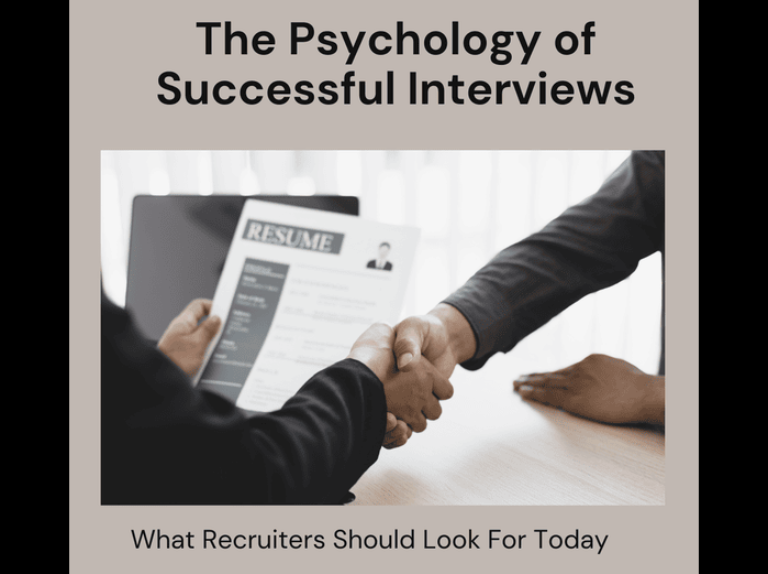The Psychology Behind Successful Interviews: What Recruiters Should Look For

In today’s competitive hiring landscape, recruiters must go beyond assessing technical skills and delve into behavioural psychology to identify the best candidates.
Successful interviews are not just about checking off qualifications—they reveal a candidate’s emotional intelligence, resilience, and alignment with company culture.
1. Emotional Intelligence and Self-Awareness
Candidates who demonstrate self-awareness and emotional control tend to perform better in team settings. Watch for cues such as active listening, empathy, and thoughtful responses. High emotional intelligence (EQ) often correlates with better leadership potential and conflict resolution abilities.
Tip: Use situational questions like, “Describe a time when you had to manage a difficult colleague. How did you handle it?” This will help candidates to reflect on their emotional responses and problem-solving skills.
2. Adaptability and Problem-Solving
Today’s business world is unpredictable, making adaptability a critical trait. Candidates who exhibit a growth mindset, openness to change, and creative problem-solving can thrive in dynamic environments.
Tip: Present hypothetical challenges and evaluate how candidates approach complex situations. Pay attention to their thought process, creativity, and decision-making speed.
3. Motivation and Cultural Fit
Understanding a candidate’s intrinsic motivation is key. Fit in employee relations helps in understanding the motivations of people: Is it their career advancement, personal development, or a higher calling? Research has shown that matching candidate and company cultures ensures lower attrition and a greater feeling of long-term satisfaction with work.
Tip: Ask open-ended questions like, “What kind of work environment helps you perform your best?” This provides insight into their preferred work culture and expectations.
4. Handling Pressure and Decision-Making
Under stress, candidates reveal their true work style. Their ability to stay composed, prioritize tasks, and make sound decisions under pressure is critical in high-stakes roles.
Tip: Use stress-inducing scenarios or timed problem-solving tasks to gauge composure and decision-making accuracy. Observe verbal and non-verbal cues that indicate confidence or anxiety.
5. Communication and Influencing Skills
Effective communication requires more than just the mere voicing of thoughts; it entails actively listening, persuading, and influencing without any authority. Leaders and client-facing roles particularly demand these skills.
Tip: Engage candidates in role-playing exercises where they must present a solution to a hypothetical challenge, analysing their clarity, persuasion tactics, and audience understanding.
6. Integrity and Ethical Judgment
Ethical decision-making is increasingly critical in a world driven by compliance and transparency. Recruiters should assess a candidate’s ability to make ethical choices under ambiguity.
Tip: Include situational questions such as, “Describe a situation where you had to choose between doing what’s right and meeting a business goal.”
Bringing It All Together
Building a high-performing synergistic organization would mean that the recruiters have acquired and perfected the art of reading between the lines. Psychological aspects of interview understanding will also ensure that candidates will be found to be emotionally compatible as well as technically competent.
A comprehensive, psychology-driven interview strategy thus developed pillars of future leadership, enhances retention, and boosts team cohesion.
HRInc Services : IT Recruitment | Non-IT Recruitment | National Recruitment


